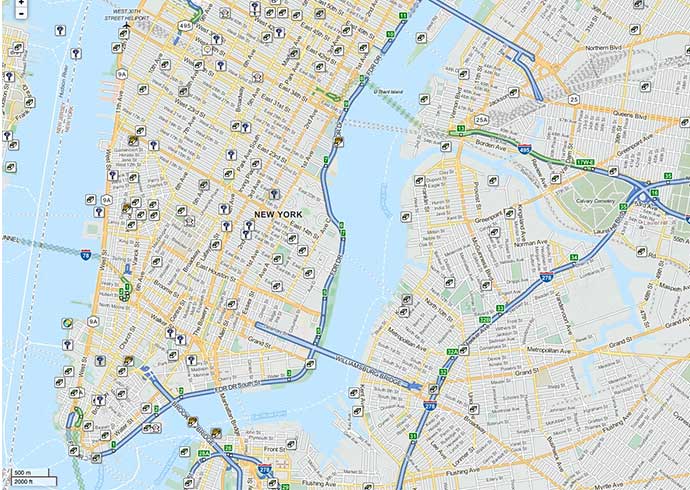This issue describes how to build your own computer, how binary numbers work, and other stories to help understand how computing happens. My essay, Life Without Digits, describes what the non-digital life feels like when you lose your smart phone.
In this article, I explore one way to have fun where technology takes you only so far. To succeed, you have to rely on your senses, mostly sight and touch, as well as your brain to figure out hints people leave behind.
The best part? Anyone can do this activity with a smart phone. It’s called geocaching. People hide stuff for other people to find. If you really find geocaching fun, you can easily hide and post your own caches for others to find.
So here are some questions I want to use to start this article: what is geocaching? what do people hide? what do tools do you need (can you use a smart phone? or do you need a GPS?)? Can you geocache in big cities like New York City, Chicago, or Miami? Plus, since this article is unscripted, we’ll find out what we find out. There will be detours.
What is Geocaching?
I started with a search at DuckDuckGo.com, a search engine. The first thing I notice in the search results: there are two geocaching websites, GeoCaching.com and OpenCaching.com. What’s up with that? Do these sites hate each other (OpenCaching.com says, on their front page, “No subscriptions. No membership fees. And the community is in control.”)?
On the OpenCaching.com site, I also notice the copyright is owned by Garmin, a GPS hardware provider. An article I find, however, suggests Garmin partnered with GeoCaching.com a few years back which led to the creation of OpenCaching.com (whose copyright, as of 2011, at least, belonged to Garmin). It’s all so confusing!
Then I find an article that (purports) to tell the tale: Garmin and GeoCaching.com were partners until GeoCaching.com decided to offer another non-Garmin device for sale to its members. Garmin had a fit and started OpenCaching.com with all the language about little guys, freedom, and openness. As of 2012, at least, Garmin was a $3 billion company, not so little. It would appear, then, GeoCaching.com is the main site in the US, possibly elsewhere, and OpenCaching.com should be looked at to see if it’s useful.
Comments to the article also point to OpenCaching.eu which links to a truly community-based alternative to GeoCaching.com. Apparently, Garmin bigfooted what had been an open source alternative to GeoCaching.com, called OpenCaching.org, by taking the OpenCaching.com domain name. Who knew such a peaceful, healthy activity could lead to such bad blood? Then again, money can ruin a lot of things.
Let’s begin by saying there appear to be two sites where you can find geocaches to hunt for and post your own. And that GeoCaching.com appears to be the first place to go. OpenCaching.eu is a useful alternative, especially in other countries.
More fun is defining geocaching. Yes, people hide stuff. But they also note the specific longitude and latitude then publish the details on a geocaching site. That’s how people go out and find what is hidden. When someone finds a cache, they can write their Geocaching.com screen name (or real name), then post their find on a geocaching site. It involves a little math, some travel, time by yourself or with family and friends outdoors, a treasure hunt, what’s not to like?
What Do People Hide?
Geocaching is treasure hunting, but done in a way for people to find stuff in good condition. Usually people put a trinket and/or a logbook in a watertight container, hide it, record the longitude and latitude, then publish this data online for others to find. You won’t find Blackbeard’s treasure, mountains of shiny gold coins, shiny jewelry, mouldering trunks, and skeletons of dead sailors. Sorry.
What Tools Do You Need?
Searching with DuckDuckGo.com again, I discovered there are a number of phone apps to help find and post caches. More interesting, I discovered people who don’t geocache apparently are called muggles. Like the humans in Harry Potter. Ouch. Unless, like me, you enjoy being human.
All the geocache apps appear to cost money. GeoCaching.com is the most expensive at $9.99 USD but they provide versions for iPhone, Android, and Windows phone. There’s also an iGeoCacher app but digging further revealed their site disappeared in 2011 when GoDaddy stopped supporting ColdFusion, a programming language. What you learn is often odd but interesting. Kids at home, pay attention: be careful what language you code your online application.
More interesting: the OpenCaching.eu blog post on the “world’s then oldest unfound Geocache, the elusive 4.5lb Walleye, placed by Jamie Matear way back on June 21st, 2001.” People took an epic eight day canoe trip ending at Fort Albany, Ontario, to find this cache, or try to find it (nothing is guaranteed, apparently, since it took 12 years to find). Definitely read the blog post, link below, since it captures perfectly the mix of goal-oriented and random that is geocaching. Indeed, I was on the OpenCaching.eu site not to read their blog but to see if they have an app (they don’t, or not that I could find).
Next I found this video on YouTube that describes how to create and register your very own geocache:
The outdoor clothing and equipment company REI also wrote an article (see bottom of this article) with a video with another interesting fact: there are two ways to identify a point on a map, two coordinate systems. The most common in geocaching is longitude and latitude expressed as degrees/minutes/seconds (DMS) or degree decimal minutes (DDM). But there’s another coordinate system, Universal Transverse Mercator (UTM), used by the military which divides a map into square gridlines 1,000 meters apart. Then again, as a vendor, REI wants you to understand how to use products they sell, in this case, GPS receivers.
The REI video also is interesting because it gets into how to find and handle caches. For example, if you take a trinket, you’re expected to leave one. And, if you find a travel bug, a metal tag and chain, you’re expected to post the bug number online then place the bug into another geocache. This lets the owner of the travel bug track their bug on its journey, some times around the world. (This reminds me of another neat activity, tracking US dollar bills, for which there are several websites.)
Finally, I also found this video from Geocaching.com that explains how geocaching works:
Can You Geocache in New York City?
The short answer: yes (see photo at top of this article). The longer answer: you might look strange hunting for a hidden package in the middle of a big city. Especially if you’re with your spouse, five little kids, and everyone is in shorts and t-shirts with floppy hats. You know, tourists. But if you’re having fun, who cares?
The most important part of finding geocaches, apparently, is doing so in a way that doesn’t let muggles see. You don’t want random people watching you find a cache then, once you leave, the person watching you moves or destroys the cache. You want other people to find the cache weeks, months, even years after you find one.
Where Does Geocaching Come From?
According to the REI article, on May 5, 2000 Dave Ulmer from Oregon posted on a USENET (now Google Groups) science newsgroup asking others to help celebrate the US government making GPS satellite navigation usable by anyone, not just the US military. Within a week of Ulmer’s post, Mike Teague created the first website devoted to collecting coordinates related to hiding and finding stashed caches. A week after this, James Coburn set up an email list on Yahoo! which still operates. Then on September 2, 2000, Jeremy Irish registered the domain name GeoCaching.com and took over Mike Teague’s database.
One other interesting detail: apparently the containers people use has changed a little over time. People often use military ammunition boxes because they’re metal and weatherproof. However, people who find them and don’t know about geocaching often get alarmed when they find something obviously military. People also have used fake rocks, hollow plastic fruit, and Tupperware for containers. As the REI article put it, “Most geocachers know not to create a cache that could be mistaken for a bomb.” You would think so, wouldn’t you?
What Does Geocaching Feel Like?
My last bit of research involved checking OpenCaching.com and Geocaching.com to see what might be stashed within fifty or a hundred miles of where we live. OpenCaching.com wouldn't let me search until I registered. Geocaching.com let me search without signing up. Even better, there are half a dozen geocaches within a mile of me.
So, of course, I went out to find at least one.
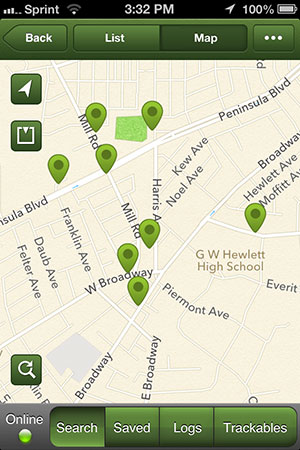
Here’s the best part of starting up the Geocaching application:
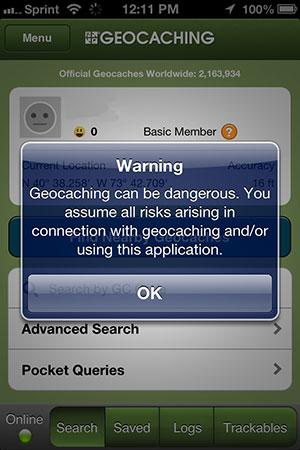
I had told my son, daughter, and wife about the geocaches near us. Everyone expressed interest. But when I actually showed up, ready to walk or drive, they all turned shy. No one wanted to expose themselves in public, standing around on some street corner running their hands up and down a street sign or sign post or whatever.
So I went on my own. Because I don't have a GPS unit, I bought the Geocaching.com app for my phone to help me find caches. The results? One found geocache (pictures below), one geocache I was too cowardly to try and find, and another geocache either not there, not easily found, or nearby in a different location.
The first geocache was at a deserted auto body shop in the next town over. Yes, it felt strange on a warm Sunday afternoon in August to wander up and down the front of the deserted shop looking carefully at all metal door frames and other magnetic surfaces. There are two apartment buildings to look down on the shop and I imagined someone looking at me and calling the cops.
Eventually I gave up on this first geocache and decided to walk to the second location. However, I don't give up easily. I stopped to look again at the Geocaching app and realized there was a hint, a single word, sign. I walked back to the auto shop, by a different route, and this time I noticed the shop sign. It's massive but unremarkable, partially hidden by trees.
At the base, however, the sign is lifted up about three inches. I sat down at the base of the sign and felt under the base in two locations, feeling very self-concious (who does this? in public?). Nothing. So I stood up and walked a bit away. Then I looked back. On my side there was a visual difference, a not black color about the size of a match book in the gap under the sign. I sat down again, felt underneath, and found the geocache.
I opened the cache to find an old piece of paper, a carefully and tightly rolled stream of paper with screen names and dates people had found this cache. There also was a penny and a heart shaped pet tag. I did not have a pen on me so I put everything back and carefully placed the cache back under the sign. I worried it might have been too far back for the next person. Then I opened the Geocache app and posted that I'd found this geocache.
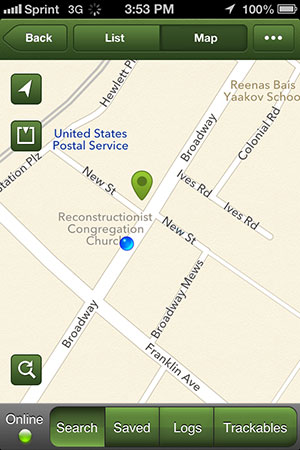
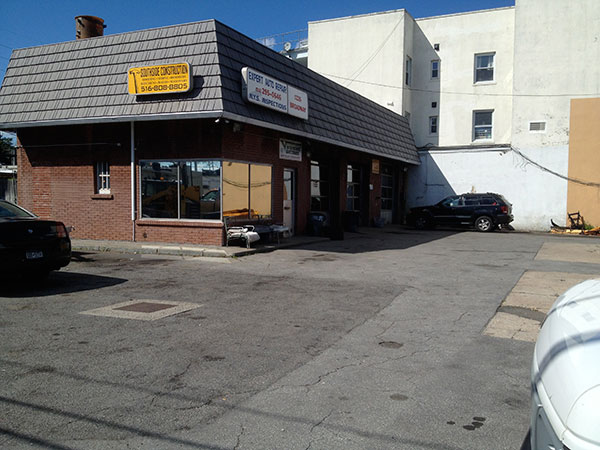
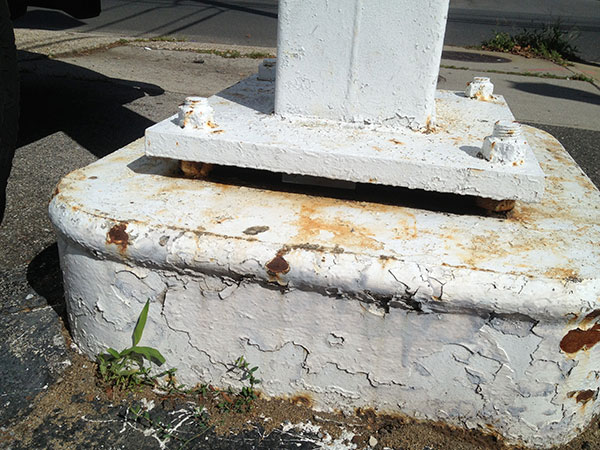
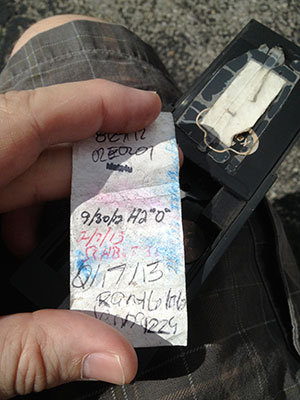
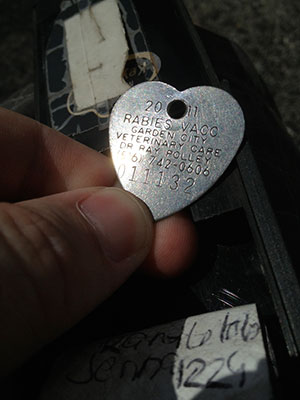
When I walked over to the next geocache, I found the car wash to be busy. So I sat in the shade of a closed dry cleaner, across the street, and enjoyed the afternoon. I reread the description of this second geocache and realized it must be a tiny box attached to one of the two signs between myself and the car wash. But I was too shy. The auto body shop had been deserted. In contrast, here at the car wash there was a clean red van, doors all open, parked, with a kid climbing in and out and his dad telling him to stop.
Reading the log for this second geocache, I realized many of the finders had travelled in pairs or small groups. Now I understood. In our society, if you need a rice cooker and Google to find your options, apparently you get visited by the police. So you keep your head down. In contrast, geocaching is a wonderfully anarchic activity. It's fun to find hidden stuff, especially with other people. It should be normal, but today it isn't normal.
Even better, geocaches create an alternate reality in plain sight. I've driven past and walked past the auto body shop for years and never realized someone had hidden a small geocache under their sign. Or that people actively knew and sought it out. That's neat.
This alternate reality experience also explained the reason geocachers call non-geocachers muggles. It is like Harry Potter, two realities with hidden doorways from one to the other if you only know where to look.
Seeing the car wash was still busy, I looked at the map of nearby geocaches and decided to try for a third one. I walked through the small neighborhood towards a CVS pharmacy and where our kids went to middle school. While I felt weird, I made myself walk behind the pharmacy to scan a chain link fence where, supposedly, there was a geocache on a chain.
I didn't find it. And happily no one came out from the pharmacy to ask me why I stood around staring at their fence. Did I mention there's a power company between the pharmacy and middle school? Presumably also with cameras? But no one there either noticed me or bothered to come out.
Back at our house, I looked up other places where I visit often. Lower Manhattan, for example, has three or four geocaches, one near the bull statue top of Bowling Green park, another on Stone Street. I've walked past both places for the past few years when in town on lunch hours.
In short, if you like treasure hunts and real life (and real time) puzzles, definitely go to Geocaching.com and type in your zip code to see what might be hidden where you live, work, and pass by. It might amaze you. And grabbing family or friends, or your students, might be fun to try and find one or more geocaches. Other than the $9.99 phone/tablet app from Geocaching.com, and a smart phone, it costs nothing but your time. And a little courage.
An Update
A week after writing this article, while running an errand around town at night, my son volunteered to go look for the geocache I could not find, near the drugstore. Hilarity ensued as I was happy to walk back and forth in the dark for a few minutes. My son quickly gave up and walked away, afraid to be labelled a terrorist. I shouted after him, “I’m with that guy!” to amuse him. We did go to another location, in a Trader Joe’s parking lot, and quickly found a micro cache tucked behind a sign. My son was excited and interested. When I posted the find with my geocache app, I got a friendly email from IslesPunkFan, the guy who had hidden the cache we found. That was pretty cool. His email also invited me to join Facebook pages for two local geocaching groups, which I did.
It also turned out the first geocache I had found, and thought I had posted the find, somehow did not post my find.
And when we traveled up to New Hampshire on vacation, I subscribed to three or four caches, none of which we had time to find, unfortunately. But I still get great emails when other people find them, which often include fun notes. My son had the rather brilliant idea of hiding a geocache in a hotel room. I wonder if anyone has been that crazy? You’d have to rent the specific room, or sneak in when the cleaning staff works the room. Anyone who has looked under a hotel bed lately knows that part of hotel rooms is rarely cleaned.
Long story short, signing up at GeoCaching.com (and/or OpenCaching.eu) to find out what is hidden in plain sight as geocaches might amuse and interest you. It might even get you started finding caches, and later hiding a few geocaches for yourself.
Learn More
GeoCaching.com vs OpenCaching.com
A mildly partisan retelling of the battle between Garmin and GeoCaching.com. Read the comments, too, if the topic interests you.
http://www.notaboutthenumbers.com/2011/12/05/opencaching-com-one-year-on/
Geocaching Sites
http://www.geocaching.com/
http://www.opencaching.eu
http://www.opencaching.com/en/
http://www.groundspeak.com/
About Geocaching
http://www.rei.com/learn/expert-advice/gps-geocaching.html
http://www.geocaching.com/guide/
Geocaching Apps
http://www.notaboutthenumbers.com/2012/09/03/top-5-iphone-apps-for-geocaching/
http://appadvice.com/appguides/show/geocaching-with-your-iphone
http://www.geocaching.com/live/default.aspx
The Elusive 4.5lb Walleye Geocache
http://blog.opencaching.us/2013/07/an-interview-with-stormgren-x-on-45lb.html
Tracking US Dollar Bills
http://www.wheresgeorge.com/
http://trackdollarbills.com/
REI Introduction to Geocaching Video
http://rei.liveclicker.com/v/3117/introduction-to-geocaching-video-gps-garmin-etrex-oregon/

